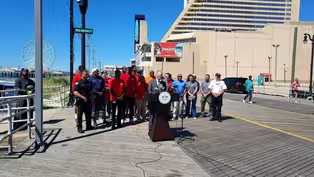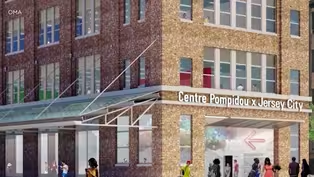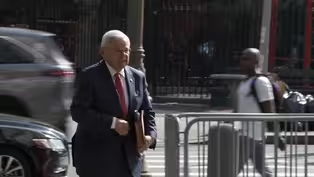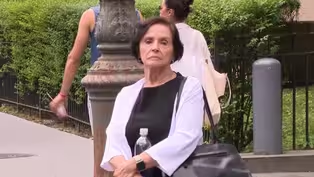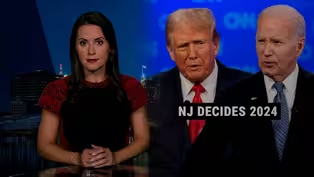NJ Spotlight News
NJ Spotlight News: July 1, 2024
7/1/2024 | 26m 50sVideo has Closed Captions
Watch as the NJ Spotlight News team breaks down today’s top stories.
We bring you what’s relevant and important in New Jersey news, along with our insight. Watch as the NJ Spotlight News team breaks down today’s top stories.
Problems playing video? | Closed Captioning Feedback
Problems playing video? | Closed Captioning Feedback
NJ Spotlight News is a local public television program presented by THIRTEEN PBS
NJ Spotlight News
NJ Spotlight News: July 1, 2024
7/1/2024 | 26m 50sVideo has Closed Captions
We bring you what’s relevant and important in New Jersey news, along with our insight. Watch as the NJ Spotlight News team breaks down today’s top stories.
Problems playing video? | Closed Captioning Feedback
How to Watch NJ Spotlight News
NJ Spotlight News is available to stream on pbs.org and the free PBS App, available on iPhone, Apple TV, Android TV, Android smartphones, Amazon Fire TV, Amazon Fire Tablet, Roku, Samsung Smart TV, and Vizio.
Providing Support for PBS.org
Learn Moreabout PBS online sponsorshipAnnouncer: Major funding for NJ Spotlight news is provided in part by NJM Insurance Group.
Serving the insurance needs of for 100 years.
Horizon Blue Cross Blue Shield of New Jersey, an independent licensee of the Blue Cross Blue Shield Association.
New Jersey realtors, the voice for real estate in New Jersey.
More information is online at NJrealtor.com.
And by the PSEG foundation.
>> Presidential immunity.
The Supreme Court hands some protections to Former President Trump who claims a big victory for democracy.
>> It is unprecedented.
>> General Bob -- Senator Bob Menendez presents the case as the trial enters its eighth week calling residents to the stand to testify on his behalf.
>> He's got to find a way to get into evidence an explanation on why all of these things of value which are stored at the house.
>> Plus, pulls -- the state polls millions of dollars from a Jersey City art museum project the mayor claims political retribution.
>> The fact that they took away money that they probably -- they previously appropriated.
>> And addressing homelessness.
Atlantic City's boardwalk Group takes measures to address high-risk shelters for those experiencing homelessness.
>> It is my job as mayor to -- as mayor to approve the necessary tools to succeed.
>> NJ Spotlight news begins right now.
♪ Announcer: From NJ PBS Studios, this is "NJ Spotlight news" with Briana Vannozzi.
Briana: Hello and thanks for joining us on this Monday.
I am Raven Santana in for Briana Vannozzi.
The Supreme Court today ruled in a 6-3 decision that former President Trump and other Presidents have absolute immunity from prosecution of official acts taken during the presidency.
However the justices ruled presidents can still be charge for acts that were not part of their official duties.
The landmark case on presidential powers is the first of its kind.
Never before has the Supreme Court considered a president could face criminal charges for actions taken while in the Oval Office.
The ruling now raises the the question, could this further delay the federal election interference case against a former president and how will this decision impact evidence in that case?
Joining me now to break down this decision is former New Jersey attorney John Farmer.
Thanks for joining me, John.
John: thank you for having me.
Briana: The court has ruled the Former President is absolutely immune to prosecution for all official acts committed as president.
Can you explain what defines an official act as opposed to an unofficial act?
John: There are three categories of tort talks about in its opinion.
Official acts are related to the core competencies of being president.
Things like the pardon power.
The power to appoint ambassadors and basically functions that seem to be the core competencies of the president are official acts conferred by the Constitution.
Unofficial acts are acts that are private in nature.
In the netherworld between those two categories, there are acts that they say are at the outer limits of a presidential power and those are sort of the heart of the opinion.
Briana: What does this mean for the ongoing January 6 investigation?
How will those actions now be defined in a court of law?
John: What the court basically held in the majority of its holding is there is no record to allow -- to decide which indictments fall into which categories.
It remands it to the trial courts to have hearings on which acts in the indictment should be considered official and therefore immune which in a netherworld have a presumption of that could be overcome and if any are completely private acts.
The one exception to what I said is if the court did say -- is that the court did say in its opinion that President Trump's consultations with the Acting Attorney General, where he was urging the Justice Department to investigate election fraud, those actions were within his core competencies as president and therefore should not have been part of the indictment, and those meetings will not even be presented to the jury in a trial.
.
Which is an unusual ruling because as part of a conspiracy, there are things called overacts.
Overacts can be completely legal.
But if they explain the conspiracy, they are admissible.
The in court said those consultations with the Justice Department are not going to be part of the indictment and are not going to be submitted to the jury.
Briana: How does this affect any of the other cases against the Former President such as the election interference case in Georgia?
Doesn't have any effect on the nonfederal cases at all -- Does it have any effect on the nonfederal cases at all?
John: It's not clear what effect it would have on the states.
It would be something to be litigated with that would have an effect at a state court -- in a state court prosecution.
The supremacy clause, you can argue because federal law is supreme, absolute immunity might affect the case.
Briana: What does this ruling mean for future presidents moving forward?
John: That is really what the court's main concern was.
The court went out of its way to say we can't just focus on the facts in front of us.
We have to consider the turn affect -- turn effect encouraging future presidents to be prosecuted by their political enemies.
The court took a much broader view than just the case in front of it.
Because it is unprecedented, The court was concerned about basically creating conditions where future presidents could be prosecuted.
My own opinion is it went too far in in the context that it did.
But I understand what the concern was the court had.
Briana: Thank you for breaking it all down and clarifying.
John, for joining me.
John: Thank you for having me.
Briana: Let the offense kicked off its case this morning in the trial of Senator Bob Menendez.
Prosecutors rested on Friday after spending seven weeks presenting evidence and testimony from more than two dozen witnesses to prove Menendez accepted bribes of cash, gold bars and a luxury car all in exchange for using his power and influence the government -- influence the governments of Egypt and Qatar.
They began building their own pace calling their own witnesses to support their claims that no crimes were committed and no bribes were paid to the Senator.
They started by focusing on family.
I am joined by senior correspondent Brenda Flanagan who has been in court all day in lower Manhattan.
The defense wasted no time in trying to undermine the prosecution's arguments to family testimony.
Two sisters testified today, let us start with Bob Menendez's older sister, what did she tell the jury?
Reporter: The defense called its first witness, 80-year-old Caridad Gonzalez.
She was petite but fierce.
She called the senator her baby brother and explains how the family fled Cuba in the 1950's, they fled with only the cash that they had managed to hide in a grandfather clock and she says when they got to the U.S., her dad drummed it to the kids, do not trust the banks, you never know what can happen, you must always have money at home.
She told jurors that in the 1980's, she did see that Menendez was stashing cash in a closet.
Where did he get the money?
A forensic accountant this afternoon said, at least out of his Senate account, every couple of weeks, the senator would withdraw $400, Raven, and that is where they are saying this money came from.
Briana: Let's move on to Nadine Menendez's younger sister.
What were the key parts of her testimony for the defense?
John: Nadine's younger sister testified that Nadine inherited half of her mother's jury and all of her grandmother's -- jewelry and all of her grandmother's gold bars.
Another inheritance type of culture.
Katya had seen some of those gold bars and Julie in this closet -- jewelry in this closet of the home that the FBI raided.
She said only Nadine had a key to that closet that Menendez did not get in there and did not know what was going on.
That is the defense's overall tactic.
That he had no idea Nadine kept him in the dark about this entire scheme.
Briana: The defense also questioned Katya about the suppose it chaos that developed between the senator and Nadine.
What did we learn?
Reporter: At one point, Nadine asked her younger sister for help.
When Bob Menendez broke up with her, she did not know what to do.
It was election night, 2018, she texted her sister you need to help me.
And so cuts he had tested the senator -- katya texted the senator.
This is what was said back.
I know he was set up.
Menendez texted her I can't get over her being with an ex-boyfriend while she was with me.
Maybe time heals all one's but not tonight -- wounds but not tonight.
It was the ex-boyfriend that was apparently so and chaos in their relationship.
The defense is saying if the couple can collaborate on the relationship, how can they collaborate on a bribery sc heme?
Reporter: Thank you, Brenda -- Briana: Thank you, Brenda.
As the defense begins their case, I spoke earlier with prosecutor Chris R. to break the strategy over the next several weeks.
Thanks for joining me, Chris.
Chris: good to see you again.
Thank you for having me.
Briana: As the case goes to defense, what is the narrative we expect he will present to the jury?
Chris: You can get the roadmap from what the defense opens on.
The arguments were essentially this -- That Senator Menendez was really just engaging in constituent services.
There was no connection.
There was no quid pro quo.
It was not a product of any specific bribes came.
And at best these were just gifts from really giving friends of Senator Menendez's wife.
His defense also opened on the fact that he did not know any of this was going on.
The statement that was used is he was kept in the dark.
I think this is going to be the theme throughout the defense case.
They will try to call witnesses to establish evidence in that regard.
Briana: Let's say on that for a second.
As you mentioned, he has said he was being kept in the dark by his wife, Nadine.
And she was the driving force behind this alleged bribery scheme.
The prosecution spent a lot of time trying to discredit that.
How does that defense prove that it was 19 and not bob who was behind the bride -- bribes?
Chris: It is difficult to do without self-serving hearsay.
I have read reports and we will find out this week.
But as I understand it, the defense intends to call Senator Menendez's wife's sister and also a sibling of his.
I think what you are going to get is some effort to try to be able to demonstrate that Nadine Menendez was in financial dire straight -- dire straits and she was embarrassed to have her husband find out about that and this was based on what the defense opened on.
In terms of the senator's sibling, he's got to find a way to get into evidence and explanation on why all of these gold bars and cash and things of value were stored at the house.
If you recall early on in the case, the judge ruled a psychologist could not testify.
I think they are going to try to introduce house Senator -- how Senator Menendez was raised and the difficulties they encountered in Cuba as an explanation as to why cash was being stored at the house.
Briana: Generational trauma or something was the defense.
Let's switch gears, how else is the defense going to try and undermine the case that the prosecution laid out?
Chris: They are going to attack -- again it is the government's burden to meet all the elements without reasonable doubt.
They will try to demonstrate there was no connection.
There was no nexus to the stings of value that were given.
At best they were gifts, gratuities.
Interestingly enough, a week ago the Supreme Court came down with a decision that could be potentially useful, Snyder versus U.S. Let -- That decision was essentially gratuities cannot be prosecuted under the 201 bribery statute, one of the counts Senator Menendez is charged with.
I think what they will try to do is say, these were just really giving constituents.
There is no connection there.
There is no -- you do this for me, I will do this for you.
I will exercise this official influence on the condition you give me on my family these gold bars and cash and my mortgage payments and such.
That's going to be their goal.
To really undermine the connection.
And just make it that it's just a gift that was not the product of a brain scheme -- bribe scheme.
Briana: Can we expect the senator to testify in his own defense?
Chris: Interestingly enough, that's not a decision that has to be advised by the government or the court until literally the last minute.
The only thing the defense knows is that will happen.
Briana: I appreciate the excellent insight.
Thank you for joining me.
Chris: Look forward to doing it again.
Take care.
Have a good fourth.
Briana: Governor Murphy Friday signed a nearly $57 billion budget into law, including record spending for K-12 education, full funding of the worker pension obligation and property tax relief.
It also includes a five year tax increase on the state's top earning companies to fund New Jersey transit.
But one thing not included is tens of millions of dollars for a controversial art museum project in Jersey City.
State officials sent a letter this weekend to the heads of the center Pompidou in Paris telling them the state is pulling funding and that the project is "no longer feasible."
But as correspondent David Cruz reports, Mayor Steve Fullop is claiming it is less about money and more about political retribution.
Reporter: There was little pomp accompanying the Pompidou project.
Just a couple of former letters to museum and city officials marking the EDA -- the end of what the mayor hoped would be a signature project of his administration.
We have decided to pause this project indefinitely, wrote CEO Tim Sullivan.
The Legislature has rescinded financial support, leaving us to determine that this project is unfortunately no longer feasible.
The other letter from the Department of State to the Jersey City redevelopment Authority was more specific, saying the legislature "the appropriate's $24 million and that states cancel the remaining $18 million, going back to the general fund."
>> The fact that they took away money the previously appropriated, they never do that, ever.
To think about a $60 billion budget with tons of things that probably are not necessary in there and go back to multiple years and take away money -- I think it speaks for itself.
Reporter: The state says this was not personal.
It was strictly business.
They say the museum would need massive public subsidy and the city's plan to keep it funded into the future just was not viable.
The state has been involved in the Pompidou process from the beginning, said Fullop.
Today, whatever.
>> It is unfortunate and shortsighted on their part and disappointing.
Reporter: The news was well received by former Governor Jim McGreevey who said the cost to taxpayers would be a third of a billion dollars, as he put it -- a third of a billion dollars as he put it.
>> The burden is going to be on the taxpayers.
If you look at other high-end investments in arts and entertainment, it is all well and good if it's going to be self-sufficient, if the burden is going to be upon the entity Reporter: Many of the state's largest arts institutions do get regular public funding for operations and sometimes for capital improvements.
But over $200 million just to open the doors, Pompidou or the French museum as its critics were fond of calling it were too heavy a lift.
says the state.
-- a lift, says the state.
He was agnostic on Pompidou in the beginning but gives Fullop credit for taking the shot.
>> Fullop going for Pompidou was a big swing.
Whn you make -- When you make big swings, it's not easy.
And it had a lot of moving parts.
The museum wanted to play ball.
The state of New Jersey obviously.
It's really strange the state just left us at the dance.
Reporter: So what now?
The city could sell the building and recuperate the $10 million it took to buy in 2017 but many residents like the idea of a building with a public mission.
Originally it was purchased to be the home of the new Jersey City Museum and community center.
Which still has a nice ring to it and would probably be less pricey, if not quite as Pompidou.
David Cruz, NJ Spotlight News.
Briana: Atlantic City's Boardwalk improvement group also known as BIG is taking additional steps to prevent homeless individuals from taking shelter underneath the boardwalk.
The announcement comes after a homeless individual died in a fire that started under the boardwalk back in April.
Ted Goldberg got a tour of the preventative measures being taken in what's considered a homeless hotspot in the city.
Reporter: In between the ocean, casino resort and the ocean itself, people experiencing homelessness in Atlantic City have looked for shelter under the boardwalk.
A new program called the boardwalk improvement group, BIG, is looking at ways to dissuade homeless people from staying there and enforce other laws affecting quality of life.
>> We know we have a problem.
.
The problems did not happen overnight they are not going to be solved overnight.
But it's our job as mayor of the great city of Atlantic City to give them a necessary tool to succeed -- the necessary tools to succeed.
The city has already completed the physical rebuilding of the boardwalk, as you can see around you.
As was announced this spring, the state has now awarded an additional $6 billion for the next phase of reconstruction.
Reporter: The repairs include fencing.
But some areas are still accessible.
Including this spot near central pier arcade where a fire killed a homeless man earlier this year.
As part of BIG, the boardwalk will have more police officers to patrol the area.
>> We are proud to introduce our new tourism district unit deployment.
45 officers, six sergeants, and a captain.
In addition, we have allocated another 12 to 14 full-time officers and two sergeants printing on overtime.
These officers are test with diligently enforcing a range of regulations.
Reporter: Another part of enforcement could be an ordinance that effectively bans homeless people from sleeping outside in public.
According to a recent Supreme Court ruling, municipalities can have these kinds of laws on the books, and it would be considered constitutional.
Atlantic City does not have an ordinance like this yet, but may small says we could see one over the next few months -- Mayor small says we could see one over the next few months.
>> Arguably, in August, it passes city Council first reading, it passes a second reading in September, and 20 days after I signed the ordinance which I will sign right away, it becomes law.
>> Definitely try to get them before they get to that point.
Reporter: He leads AC's Department of Health and Human Services.
He says the job of his team is to try to take care of people experiencing homelessness before police have to get involved.
>> We go out and say, hey, look, the cops are here to do their job as far as enforce the laws, we try to get to the individuals before they actually got to that point and get them the services they need.
Reporter: If homeless people say they don't want help -- >> We come back to the same spot because more than likely they are in the same spot every single day.
We will keep going back to them like the mayor said, we stay on top of them.
We ask them every single day.
Do you need assistance?
Do you need assistance?
And eventually a lot of times they break down and say, I do need assistance.
And we start the process.
Reporter: The city estimates 39 residents are homeless but leaders say there is no estimate for the homeless people sent here via buses.
>> You don't see who was sending them, you don't know who is sending them, they just come and when you find out who they are, you have people from as far out as California, Canada.
We can't control that.
All I can ask is my fellow leaders, municipalities, stop using the great city of Atlantic City as your dumping ground.
Reporter: Advocates have warned that ordinances banning sleeping outside would essentially criminalize homelessness.
While leaders say laws are needed to protect locals, tourists and people experiencing homelessness.
In Atlantic City, Ted Goldberg, NJ Spotlight News.
Briana: In our business report, starting today, NJ transit commuters will notice it will cost them more to get to their destinations.
A 15% fare hike will go into effect after customers have dealt with delays and cancellations for weeks, leaving thousands stranded.
Many of the delays have been blamed on severe heat and disabled trains.
Today's price increase is followed by an indefinite 3% annual increase starting July 1, 2025, along with the fare hikes, the flex pass which provided 21-way tickets at a 20% discount will be discontinued starting today.
All printed and digital one-way tickets will now expire after 30 days.
Any one-way tickets purchased before today have also expired regardless of their original date of purchase.
Nj transit leaders say the new prices will help close a more than $100 million budget deficit.
This is NJ transit first fare hike and almost a decade.
On Wall Street, stocks kept off the second half of the year on the rise.
Here's a look at the final board.
♪ Briana: That's going to do it for us tonight.
Before you go, a reminder to download the NJ Spotlight News's podcasts -- NJ Spotlight News podcast so you can listen to us at any time.
Thanks for being with us.
Have a great night.
We will see you back here tomorrow.
>> New Jersey education Association, making public schools great for every child.
RWJ Barnabas health.
Let's be healthy together.
And New Jersey realtors.
The voice of real estate in New Jersey.
More information is online at NJrealtor.com.
>> NJM insurance group has been part of New Jersey for over a century.
We support our communities through our corporate giving program supporting arts and culture related and nonprofit organizations that serve to improve the lives of children, rebuild communities and help create a new generation of safe drivers.
We are proud to be part of New Jersey.
NJM, we've got New Jersey covered.
♪ >> I am very grateful that I'm still here.
>> That's me and my daughter when we want to celebrate our first anniversary.
>> With a new kidney, I have strengths.
>> It gave me nearly felt life.
>> I'm still going everywhere and exploring new cases.
>> Nobody thought I was going to be here.
>> I look forward to getting older with my wife.
It's possible now.
>> We are transforming lives through donor programs at our hospitals.
Our WJ -- Rwj Barnabas health.
Let's be healthy together.
.
♪ [CAPTIONING PERFORMED BY THE NATIONAL CAPTIONING INSTITUTE, WHICH IS RESPONSIBLE FOR ITS CAPTION CONTENT AND ACCURACY.
VISIT NCICAP.ORG]
Analysis of US Supreme Court’s Trump immunity decision
Video has Closed Captions
Clip: 7/1/2024 | 6m 23s | Interview: John Farmer, former New Jersey attorney general (6m 23s)
Atlantic City tries to stop people sleeping under boardwalk
Video has Closed Captions
Clip: 7/1/2024 | 4m 6s | Measures include new fencing to impede access (4m 6s)
Au revoir to Jersey City's 'French museum'?
Video has Closed Captions
Clip: 7/1/2024 | 4m 26s | State funding cut to Pompidou satellite leaves museum in doubt (4m 26s)
Defense launches in Menendez corruption trial
Video has Closed Captions
Clip: 7/1/2024 | 4m 32s | Interview: Chris Gramiccioni, former assistant U.S. attorney for New Jersey (4m 32s)
Menendez's sister takes the stand
Video has Closed Captions
Clip: 7/1/2024 | 3m 56s | Menendez’s older sister testified about their family’s habit of storing cash at home (3m 56s)
Dems reel, GOP celebrates after first presidential debate
Video has Closed Captions
Clip: 6/28/2024 | 7m 2s | Biden's missteps fuel questions while Trump's dishonesty went largely unchecked (7m 2s)
Providing Support for PBS.org
Learn Moreabout PBS online sponsorship
- News and Public Affairs

Top journalists deliver compelling original analysis of the hour's headlines.

- News and Public Affairs

FRONTLINE is investigative journalism that questions, explains and changes our world.












Support for PBS provided by:
NJ Spotlight News is a local public television program presented by THIRTEEN PBS

